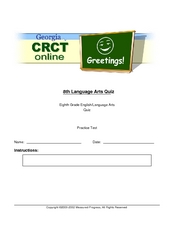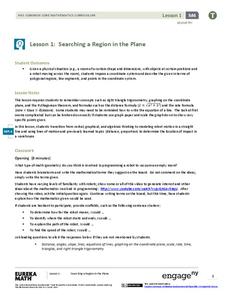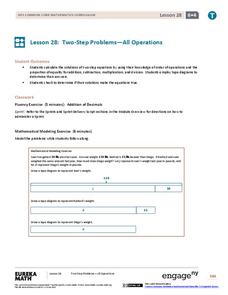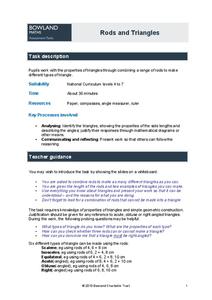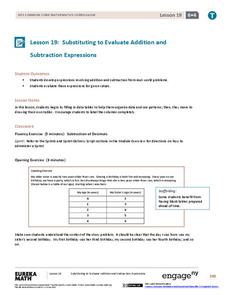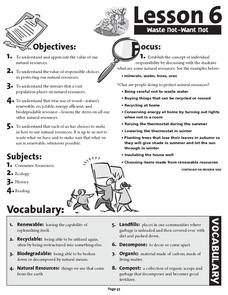Indian River State College
Comma Rules and Practice
Keep those commas in line by applying the rules! Pupils can use the first page here as a reference (it includes thirteen comma rules and examples for each) as they work through the two exercises provided for practicing proper punctuation.
Curated OER
Georgia CRCT Online: 8th Language Arts Quiz
Review word choice and grammar skills with this practice test for the Georgia Criterion-Referenced Competency Test (CRCT). Fifteen multiple-choice questions prompt eighth graders to recall writing strategies, grammar skills, and...
Polk Bros Foundation
Answer the BIG Question with Cited Examples and Evidence
Close up your unit of study with an examination of one of the guiding or essential questions as it relates to what your class has studied and other research. Class members first write down the question. Then they note down information...
US Environmental Protection Agency
Thirstin's Wacky Water Adventure
Make a splash with young scientists as you teach them all about water using this activity packet. Thirstin, a cartoon glass of water, walks children through the water treatment process, teaches them about different sources of water, and...
MLC
Decimals Worksheets
Make sure your students' understanding of fractions is on-point using this series of skills practice worksheets. Covering a variety of topics from basic place value and fraction/decimal conversion, to performing all four operations...
Curated OER
3rd Grade Social Studies Core Skills (Reference Books)
In this reference materials worksheet, students complete the 20 multiple choice questions pertaining to the correct book needed to find the answer in each situation. Included are dictionary, atlas, encyclopedias, newspapers and maps.
EngageNY
Real-World Positive and Negative Numbers and Zero
Class members investigate how positive and negative numbers are useful in the real world. Individuals first read a short passage and identify terms indicating positive and negative numbers. They consider situations involving positive...
Curated OER
Los Pronombres en Espanol
Give your Spanish speakers this reference guide on subject pronouns, reflexive pronouns, direct object pronouns, and indirect object pronouns. There are a few examples provided, but walk your class through this worksheet to ensure...
Curated OER
Making Nouns Plural-Worksheet 1
How do you pluralize nouns in Spanish? Is there a difference between a plural noun ending in a vowel and one ending in a consonant? Yes, there is! Give your Spanish class this reference tool, and they can learn the rules!
EngageNY
Searching a Region in the Plane
Programming a robot is a mathematical task! The activity asks learners to examine the process of programming a robot to vacuum a room. They use a coordinate plane to model the room, write equations to represent movement, determine the...
EngageNY
Modeling a Context from a Verbal Description (part 1)
When complicated algebraic expressions are involved, it is sometimes easier to use a table or graph to model a context. The exercises in this lesson are designed for business applications and require complex algebraic...
EngageNY
From Ratio Tables, Equations and Double Number Line Diagrams to Plots on the Coordinate Plane
Represent ratios using a variety of methods. Classmates combine the representations of ratios previously learned with the coordinate plane. Using ratio tables, equations, double number lines, and ordered pairs to represent...
EngageNY
Ratios
Create ratios using the boys and girls in the class. The first lesson plan in a 29-part series introduces ratios. Pupils learn to create ratios, write them, and model them with tape diagrams. Class members realize that there are...
EngageNY
Two-Step Problems—All Operations
Step 1: Use the resource. Step 2: Watch your class become experts in solving two-step problems. Scholars learn to solve two-step word problems in context. They use tape diagrams and algebraic techniques to break the problem into two,...
EngageNY
Understanding Box Plots
Scholars apply the concepts of box plots and dot plots to summarize and describe data distributions. They use the data displays to compare sets of data and determine numerical summaries.
Bowland
Rods and Triangles
Scholars explore triangles with rods of different lengths. Using rods of 2, 4, 6, 8, and 10 cm class members build as many different types of triangles as they can. They also describe properties of these triangles and determine...
EngageNY
The Relationship of Addition and Subtraction
Add an outstanding resource to your repertoire. The first installment of a 36-part module looks at the relationship between addition and subtraction through an activity using tape diagrams. Pupils develop the identities w – x + x =...
EngageNY
Substituting to Evaluate Addition and Subtraction Expressions
Substitute this resource for what you used to use. Learners identify patterns in data tables and write addition and subtraction expressions to represent relationships. Substitution allows them to solve problems in context in the 20th...
EngageNY
Why Worry About Sampling Variability?
Are the means the same or not? Groups create samples from a bag of numbers and calculate the sample means. Using the sample means as an estimate for the population mean, scholars try to determine whether the difference is real or not.
EngageNY
Selecting a Sample
So what exactly is a random sample? The 15th part in a series of 25 introduces the class to the idea of selecting samples. The teacher leads a discussion about the idea of convenient samples and random samples. Pupils use a random...
EngageNY
Replacing Letters with Numbers II
Teach about properties properly. Individuals investigate the commutative and identity properties for both addition and multiplication. They see that the properties hold true for all values by using substitution to test out several examples.
Forest Foundation
Waste Not - Want Not
Recycling is the focus in the sixth of a nine-instructional activity series devoted to forest ecosystems. Class members read an article about the responsible use of natural resources and ways to reduce land fill.
National Math + Science Initative
Introduction to Decimals
Three activities make up an introductory lesson designed to create a strong foundation in comparing fractions to decimals and exploring and building decimal models. Pupils brainstorm and complete a Venn diagram to show how decimals and...
Curated OER
Who Took Jerell's iPod? ~ An Organic Compound Mystery
Within the setting of a crime scene investigation, biochemistry beginners analyze organic compounds as a means of determining "Who dunnit." They use a brown paper test for lipids, glucose test strips and iodine to identify carbohydrates,...

